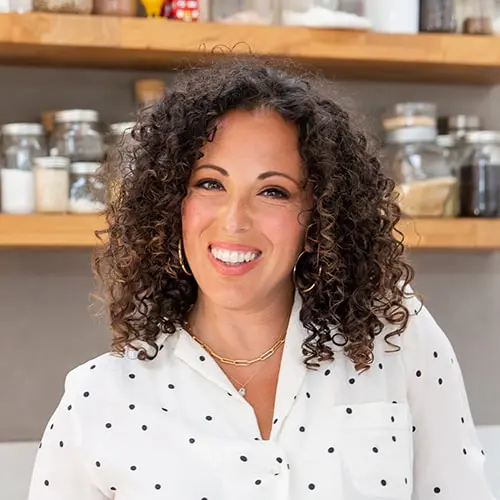In Part One of this post, I explained the link between PCOS and adult acne. I also explained why PCOS is misunderstood and underdiagnosed. If you haven’t read it yet, make sure you go back and read Part One here. In Part Two, I’ll explain how I help women address adult acne and PCOS in my clinic.
How I Help Women With Adult Acne
Whether or not you have a clinical diagnosis of PCOS, adult acne is almost always related to hormone imbalance. In my clinic, I use a multi-faceted approach to treating hormone imbalances.
Step 1 is always proper testing to determine exactly what type of hormone imbalance you’re dealing with – there is no “one size fits all” treatment, so proper testing is critical to healing. Every woman I work with recieves a customized plan for healing based on her test results, symptoms, and lifestyle – but there are some general recommendations I start with for many women:
- Optimize Your Diet For Hormone Health
- Nurture Your Microbiome
- Lower Stress
- Promote Ovulation
- The Right Skin Care Routine
Optimize Your Diet For Hormone Health
You don’t need to go on a no-carb diet or severely restrict to optimize your diet for healthy hormones (in fact, that is probably the worst thing you can do!). Start with balancing your blood sugar and insulin. Almost all women with PCOS (regardless of weight) show some signs of insulin resistance.
You can counteract this and get back to healthy blood sugar by:
- Optimizing the amounts and types of carbs you eat. (It’s not about cutting carbs completely. Instead, eat more whole-food carbs, fewer processed carbs.)
- Moving more! It doesn’t have to be in the gym – walk more, hike, dance, swim, just stay active throughout the day.
- Using key supplements. The exact supplements and doses matter, so work with a pro to add in things like inositols, d-pinitol, curcumin, chromium, and berberine – if they are right for you.
Key nutrients for healing acne are:
- Vitamin A – natural sources are cod liver oil, liver, pastured egg yolks.
- Zinc – zinc has been shown to clear acne as effectively as antibiotics! It also interacts positively with Vitamin A. Dietary sources are organ meats, beef and lamb, oysters and scallops.
- Omega-3 fats – These fats are anti-inflammatory and reduce your skin’s reactivity to UV light, too. EPA and DHA are the best sources – find them in fatty fish or a high-quality supplement.
You should also consider cutting dairy from your diet. I don’t like to make blanket dietary suggestions, but for women with acne and PCOS, cutting dairy is almost always helpful.
Here’s why: there is a hormone in milk (from cows, goats, sheep, and camels) called insulin-like growth factor-1 (IGF-1) which mimics insulin in our body. IGF-1 is a growth hormone (which makes sense, as milk is for baby animals!).
In most people, a little dairy here and there can be well-tolerated – humans have a binding protein for IGF-1 that inactivates it. But for women with PCOS or hormonal imbalance who already are likely to be insulin-resistant or have high insulin, the added burden of IGF-1 can be a problem. This is amplified because women with PCOS have LESS of the binding protein for IGF-1 and higher IGF-a levels than other people do, too. And the ovaries of women with PCOS are more sensitive to IGF-1 (and other growth hormones), too.
IGF-1 can also cause your ovaries to overproduce testosterone (an androgen) – which is something we’re trying to minimize.
Not only all of that – but IGF-1 also increases sebum production and inflammation in the skin – sebum is oil on your skin – and encourages new cell growth. As new cells grow, old ones die and are shed.This means more oil and old skin cells potentially clogging pores and causing acne.
For all of these reasons I do recommend you try cutting out dairy if you’re dealing with PCOS or acne. Grass-fed butter and ghee are OK to keep in, as they are almost entirely fat and don’t contain much, if any, IGF-1.
Nurture Your Microbiome
A healthy microbiome is critical for both hormone health and lowering overall inflammation to help calm your skin.
The right gut flora is a main player in regulating your hormones, especially your estrogen levels. If you have too much of the wrong bacteria, the result can be increased estrogens in circulation.
Eating a whole-foods-based diet and taking probiotics are obvious ways to care for your microbiome – but if you’re already doing that and still having gut issues, I highly recommend advanced stool testing. Common gut infections like Blastocystis hominis, H. pylori, candida, and staph or strep overgrowth in the gut correlate to acne in patients. There is also a huge connection between Small Intestine Bacterial Overgrowth (SIBO), candida, and acne – especially rosacea.
Endotoxins released into the bloodstream by a leaky gut (aka increased intestinal permeability) are also a major cause of inflammation in the body and can impact the skin, too.
Lower Stress
This is the advice everyone hates – but it is the MOST important step toward achieving long-term health.
The reason people hate the advice to lower their stress is because they feel like most of their stressors are outside their control (bills, deadlines, work, family drama!) – but the truth is that there are many small steps you CAN control that can help reduce the burden of stress on your body.
Some simple but powerful things you can start doing right now:
- Get quality sleep – that means going to bed with 7-8 hours before you have to wake
- Avoid blue light after sunset – get the glasses, change the settings on your phone, and dim the lights inside
- Start a daily meditation/gratitude practice – just 5-10 minutes can set the tone for your entire day
Promote Ovulation
Supplementation should always be done only after proper testing and consulting with a practitioner. That being said, there are supplements that can support and promote ovulation that I use with my patients:
- Flaxseed and DIM to address excess estrogen
- Saw palmetto, reishi, pygeum, zinc, white peony/licorice, and green tea to slow the conversion of estrogen to testosterone
- Vitex (aka chasteberry) to support Hypothalamic-Pituitary-Ovarian signalling and progesterone production.
- Adrenal and thyroid support, as needed (this is why you need proper testing!)
The Right Skin Care Routine
A pimple here or there – or a bad breakout after you use a new face wash – is potentially a topical issue. That means it has to do with what you’re putting on to your skin from the outside, externally. But most cases of adult acne are more a result of internal imbalances (like we’ve been talking about in this article).
That being said, what you put on your skin still matters. Don’t use harsh products externally on your skin. Instead, try more simple options. I love:
- Mother Dirt spray (promotes a healthy skin bacteria)
- NERD skincare system
- Homemade masks with Manuka honey, tea tree oil, turmeric powder, and apple cider vinegar
This Is A Whole-Body Issue
I hope you take away this key point from this article: acne is a whole-body issue, not just a skin thing!
Whether you have PCOS or not, if you have adult acne, it is a sign that something isn’t working right in your body. From gut issues to hormone imbalances, there are multiple overlapping, underlying causes that could be causing your skin troubles.
But, I also hope you now understand that PCOS is underdiagnosed and misunderstood – and it could be affecting you.
Once I discovered that truth, I was finally on my way to #clearskineveryday (not to mention better moods, healthy monthly cycles, & healthier hair and nails!).
I’m passionate about helping women uncover the root causes of their health problems and address them naturally. If you’re dealing with adult acne, I’d love for you to book a free 20-minute root cause symptom analysis consultation with my team. These appointments are TOTALLY free, and there’s no obligation to book any further appointments. See what time slots we have open here.
At the Reverse-Age Method, we believe in a holistic approach to perimenopause and beyond, that addresses the root causes of your symptoms (like insomnia, hot flashes, night sweats, erratic periods, fatigue, skin aging, weight gain, and brain fog)– to also slow the pace that your cells are aging. Whether it’s improving gut health, optimizing detox function, enhancing mitochondrial function, or building muscle mass, our comprehensive program has got you covered.
If you’re new here, be sure to check out our Blog Page for more insights and tips on how to thrive during perimenopause. Our blog is packed with practical advice, success stories, and the latest research to help you on your journey.
For more updates and community support, follow us on social media:
You May Also Like...
Addressing HPV with Functional Medicine Part 1
HPV is a scary diagnosis… you can’t see it, you probably can’t feel it… and suddenly you’re hearing the big “C” word:…
All About Food Sensitivities – New Cutting Edge Test Available! (KMBO FIT Test)
One of the primary tenants of Functional Medicine is to identify triggers for inflammation and reduce exposure.…
Whether you’re looking for help with your gut, your hormones, or both, our team of practitioners work together to treat the WHOLE you – guiding you to a healthier mind, body, and spirit day by day.



